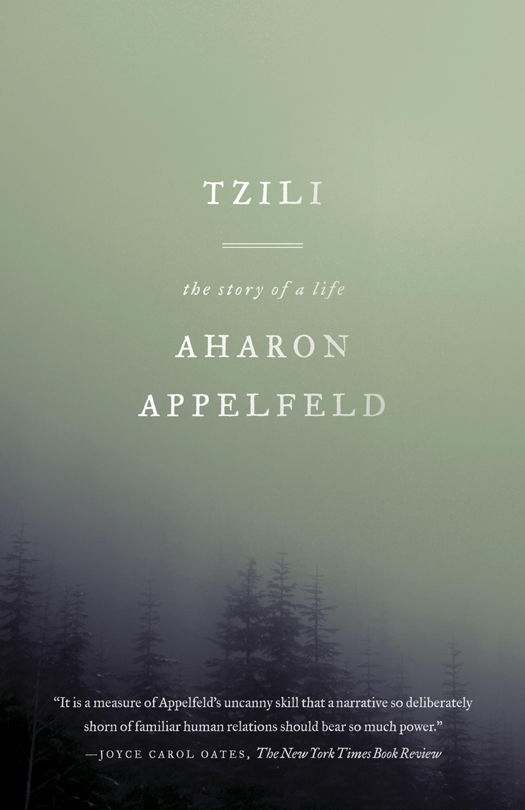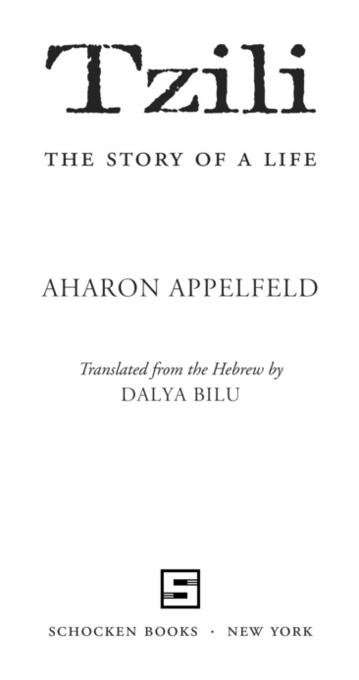This is a work of fiction. Names, characters, places, and incidents either are the product of the authors imagination or are used fictitiously. Any resemblance to actual persons, living or dead, events, or locales is entirely coincidental.
Copyright 1983 by Aharon Appelfeld
All rights reserved. Published in the United States by Schocken Books, a division of Random House, Inc., New York, and in Canada by Random House of Canada Limited, Toronto. Originally published in Hebrew in Israel as HaKutonet ViHaPasim by Hakibbutz Hameuchad Publishing House, Ltd., Tel Aviv, in 1983. This translation was originally published in hardcover in the United States by E. P. Dutton, Inc., New York, in 1983.
Schocken Books and colophon are
registered trademarks of Random House, Inc.
Library of Congress Cataloging-in-Publication Data
Appelfeld, Aron.
[Kutonet veha-pasim. English]
Tzili : the story of a life / Aharon Appelfeld.
p. cm.
eISBN: 978-0-8052-1253-2
1. Holocaust, Jewish (19391945)Fiction. I. Title.
P J5054. A 755 K 813 2012 892.436dc23 2011050301
www.schocken.com
Cover photograph by Alexander Kenney Photography/Flicker/Getty Images
Cover design by Linda Huang
v3.1
Contents
1
P ERHAPS IT WOULD BE better to leave the story of Tzili Krauss life untold. Her fate was a cruel and inglorious one, and but for the fact that it actually happened we would never have been able to tell her story. We will tell it in all simplicity, and begin right away by saying: Tzili was not an only child; she had older brothers and sisters. The family was large, poor, and harassed, and Tzili grew up neglected among the abandoned objects in the yard.
Her father was an invalid and her mother busy all day long in their little shop. In the evening, sometimes without even thinking, one of her brothers or sisters would pick her out of the dirt and take her into the house. She was a quiet creature, devoid of charm and almost mute. Tzili would get up early in the morning and go to bed at night like a squirrel, without complaints or tears.
And thus she grew. Most of the summer and autumn she spent out of doors. In winter she snuggled into her pillows. Since she was small and skinny and didnt get in anyones way, they ignored her existence. Every now and then her mother would remember her and cry: Tzili, where are you? Here. The answer would not be long in coming, and the mothers sudden panic would pass.
When she was seven years old they sewed her a satchel, bought her two copybooks, and sent her to school. It was a country school, built of gray stone and covered with a tiled roof. In this building she studied for five years. Unlike other members of her race, Tzili did not shine at school. She was clumsy and somewhat withdrawn. The big letters on the blackboard made her head spin. At the end of the first term there was no longer any doubt: Tzili was dull-witted. The mother was busy and harassed but she gave vent to her anger nevertheless: You must work harder. Why dont you work harder? The sick father, hearing the mothers threats, sighed in his bed: What was to become of them?
Tzili would learn things by heart and immediately forget them again. Even the gentile children knew more than she did. She would get mixed up. A Jewish girl without any brains! They delighted in her misfortune. Tzili would promise herself not to get mixed up, but the moment she stood in front of the blackboard the words vanished and her hands froze.
For hours she sat and studied. But all her efforts didnt help her. In the fourth grade she still hadnt mastered the multiplication table and her handwriting was vague and confused. Sometimes her mother lost her temper and hit her. The sick father was no gentler than the mother. He would call her and ask: Why dont you study?
I do study.
Why dont you know anything?
Tzili would hang her head.
Why are you bringing this disgrace on your family? He would grind his teeth.
The fathers illness was fatal, but the dull presence of his youngest daughter hurt him more than his wound. Again and again he blamed her laziness, her unwillingness, but never her inability. If you want to you can. This wasnt a judgment, but a faith. In this faith they were all united, the mother in the shop and her daughters at their books.
Tzilis brothers and sisters all worked with a will. They prepared for external examinations, registered for crash courses, devoured supplementary material. Tzili cooked, washed dishes, and weeded the garden. She was small and thin, and kneeling in the garden she looked like a servant girl.
But all her hard work did not save her from her disgrace. Again and again: Why dont you know anything? Even the gentile children know more than you do. The riddle of Tzilis failure tortured everyone, but especially the mother. From time to time a deep groan burst from her chest, as if she were mourning a premature death.
In the winter evil rumors were already rife, but only echoes reached the remoter districts. The Kraus family labored like ants. They hoarded food, the daughters memorized dates, the younger son drew clumsy geometric figures on long sheets of paper. The examinations were imminent, and they cast their shadow over everyone. Heavy sighs emerged from the fathers darkened room: Study, children, study. Dont be lazy. The vestiges of a liturgical chant in his voice aroused his daughters ire.
At home Tzili was sometimes forgotten, but at school, among all the gentile children, she was the butt of constant ridicule and scorn. Strange: she never cried or begged for mercy. Every day she went to her torture chamber and swallowed the dose of insults meted out to her.
Once a week a tutor came from the village to teach her her prayers. The family no longer observed the rituals of the Jewish religion, but her mother for some reason got it into her head that religious study would be good for Tzili, besides putting a little money the old mans way. The tutor came on different days of the week, in the afternoons. He never raised his voice to Tzili. For the first hour he would tell her stories from the Bible and for the second he would read the prayer book with her.
At the end of the lesson she would make him a cup of tea. How is the child progressing? the mother would ask every now and then. Shes a good girl, the old man would say. He knew that the family did not keep the Sabbath or pray, and he wondered why it had fallen to the lot of this dull child to keep the spark alive. Tzili did her best to please the old man, but as far as reading was concerned her progress left much to be desired. Among her brothers and sisters the old mans visits gave rise to indignation. He wore a white coat and shabby shoes, and his eyes glinted with the skepticism of a man whose scholarship had not helped him in his hour of need. His sons had emigrated to America, and he was left alone in the derelict old house. He knew that he was nothing but a lackey in the service of Tzilis familys hysteria, and that her brothers and sisters could not bear his presence in the house. He swallowed his humiliation quietly, but not without disgust.
At the end of the reading in the prayer book he would ask Tzili, in the traditional, unvarying formula:
What is man?
And Tzili would reply: Dust and ashes.
And before whom is he destined to stand in judgment?
Before the King of Kings, the Holy One blessed be He.








